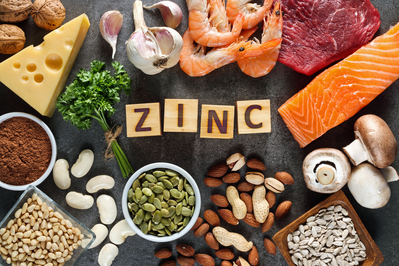
September 1, 2024
Ever wondered which vitamins and minerals are important and why? Zinc is not talked about often, but it’s an incredible mineral that plays a significant role in how your body functions! If you want to learn more about the health benefits of zinc, then keep reading!
What is zinc?

The second most abundant trace mineral in the body (after iron) Zinc is considered one of the essential nutrients because it isn’t produced by the body and must be obtained from diet alone. Present in nearly every cell, it is essential for enzyme reactions, gene expression, DNA and protein synthesis, immune function, skin health, and overall growth and development. It is also an antioxidant, meaning that it has the ability to fight inflammation and prevent cell damage. Zinc even has a part in your sense of taste and smell! In fact, one of the key signs of zinc deficiency is a decline in the ability to taste and smell.
What are the health benefits of zinc?
- Fight germs– zinc has the potential to shorten a cold by giving your immune system a boost; it can especially help prevent infection and chronic illness in older adults.
- Help relieve oxidative stress– its anti-inflammatory properties also boost your body’s natural immune response and can even affect your blood sugar and cholesterol levels.
- Support wound healing– zinc can help with healing wounds faster since it works with collagen protein synthesis.
- Improve acne– both topical and oral forms of zinc could be a beneficial treatment for acne by reducing inflammation and slowing the growth of bacteria.
- Protect eyesight– research has been done regarding zinc and its benefits for age-related macular degeneration along with other vitamins for eye health.
What are good food sources of zinc?

Your body doesn’t store zinc in reserve as it does with other vitamins and minerals, so it’s important to get enough zinc into your diet every day. Some food sources of zinc include eggs, mushrooms, oats and brown rice, nuts and seeds (especially pumpkin seeds), beans and lentils, seafood particularly salmon, sardines, crab, oysters, and lobster, other meats such as beef, pork, chicken, and turkey, and finally vegetables including kale, peas, asparagus, and beets. Many cereals and dairy products are fortified with zinc, and the protein sources mentioned above have the most zinc content, while the rest have smaller amounts that aren’t absorbed as well by the body, which is why zinc supplements can be useful in maintaining healthy zinc levels.
Two Beneficial Zinc Supplements For You
Optimum Zinc features a form called Zinc Picolinate which has been researched in regards to its immune and respiratory health benefits in addition to supporting connective tissue growth and development. Also, Zinc Picolinate has been connected to healthy testosterone metabolism and prostate health in men!
Our Ultra Zinc supplement provides 54 mg per dose of highly bioavailable zinc, meaning that it’s designed for enhanced absorption. The formula uses the amino acid chelate form of zinc (zinc glycinate) by TRAACS® for optimal utilization and gastrointestinal comfort. Before starting any new supplement, talk with your healthcare provider about adding it to your wellness routine, and don’t hesitate to reach out to our pharmacy experts if you have questions about our supplements and their ingredients.
Now that you know the health benefits of zinc, order Ultra Zinc or Optimum Zinc online today or stop by and get yours in-store at our pharmacy location in Mason City IA.



